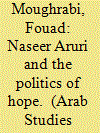| Srl | Item |
| 1 |
ID:
146417


|
|
|
|
|
| Summary/Abstract |
A comparative approach is necessary when examining the role of Palestinian scholars and activists in defense of their cause. A look at the role of Native American scholars and activists reveals some similarities. Both groups worked hard to prevent the erasure of their identity by the settler colonial invaders. Another common theme is the emphasis on a politics of hope. Professor Aruri was a man of the left which has been in retreat throughout the Arab World. A renewed critique is necessary before the left can be resurrected. This offers the only democratic hope for the region.
|
|
|
|
|
|
|
|
|
|
|
|
|
|
|
|
| 2 |
ID:
188993


|
|
|
|
|
| Summary/Abstract |
In 2004, Anna Agathangelou and L.H.M. Ling wrote their important intervention, entitled ‘The House of IR: From Family Power Politics to the Poises of Worldism,’ that ordered various theories of International Relations within an analogy of a colonial household, calling instead for a Worldism that builds communities based on interests and support. One glaring omission from this analysis, however, is mention of indigeneity. Increasingly, in North America, the experiences of Indigenous peoples are shaping national imaginations and popular political discourses – take for instance Idle No More, the Truth and Reconciliation Commission of Canada, Standing Rock, and Mauna Kea, to name a few. These shifts seen at a national level in North America, however, are not fully reflected in the field of IR. In fact, it would be easy to conclude that the field of IR has largely ignored Indigenous lived-experience. To this, this article asks how IR theorising, practice, and pedagogy could be significantly transformed by taking seriously Indigenous experiences and knowledge? To explore this question, this article explores the two central IR concepts of power and sovereignty to illustrate how the meanings and practices of these concepts are significantly furthered by attention to Indigenous experiences, practices, and knowledge. It concludes by asserting that an Indigenous approach to IR would not only be a mechanism for incisive analysis and critique of dominant constructions within the field, but also could provide an emergent space for (re)imagining collective futures across race and difference – something sorely needed in a world of ever increasing uncertainty.
|
|
|
|
|
|
|
|
|
|
|
|
|
|
|
|